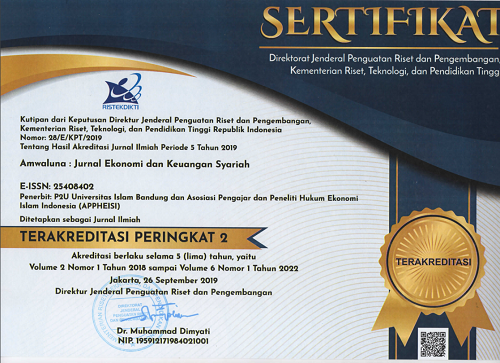THE INFLUENCE OF ISLAMIC ENTREPRENEURSHIP TOWARDS THE ORGANIZATION PERFORMANCE THROUGH ORGANIZATION COMMITMENT IN MA’SOEM GROUP
Abstract
The purpose of this research is to discuss the influence of Islamic entrepreneurship towards the organization performance through organization commitment. The object of this research is the unit leader and division leader in Ma’soem Group. The appropriate sample used has been randomly chosen by probability sampling method with 118 respondents. Data analysis is conducted using Structural Equation Modeling (SEM). The result of research shows that Islamic entrepreneurship is affecting the organization performance, and the organization commitment do not affect the organization performance. For indirect influence, organization commitment cannot mediate the influence of Islamic entrepreneurship towards organization performance.
Keywords
Full Text:
PDFReferences
Faizal, P. R. M., Ridhwan, A. A. M., & Kalsom, A. W. (2013). The Entrepreneurs Characteristic from al-Quran and al-Hadis. International Journal of Trade, Economics and Finance, 4(4), 191–196. https://doi.org/10.7763/IJTEF.2013.V4.284
Irefin, P., & Mechanic, M. A. (2014). Effect of Employee Commitment on Organizational Performance in Coca Cola Nigeria Limited Maiduguri, Borno State. IOSR Journal Of Humanities And Social Science, 19(3), 33–41.
Kaplan, R. S., & Norton, D. P. (1992). The balanced scorecard – measures that drive performance. Harvard Business Review, 71–79.
Luthans, F. (2010). Organizational Behavior (12th ed.). Pennsylvania: McGraw-Hill Education.
Oukil, M. S. (2013). Entrepreneurship and entrepreneurs in an islamic context. Journal of Islamic and Human Advanced Research, 3(3), 111–131.
Ramadani, V., Dana, L.-P., Ratten, V., & Tahiri, S. (2015). The context of Islamic entrepreneurship and business: concept, principles and perspectives. International Journal Business and Globalisation, 15(3), 244–261.
Ratten, V. (2014). Entrepreneurship in developing regions. International Journal of Entrepreneurship and Small Business, 22(2), 135–137.
Razak, K. A. (2017). Islamic Entrepreneurship Model. In Internasional Muamalat and Entrepreneurship Conference (IMEC 4). Negeri Sembilan: Universiti Sains Islam Malaysia.
Robbins, S. P., & Timothy, A. (2013). Organizational behavior (15th ed.). New Jersey: Prentice Hall.
Setiawan, S., & Mauluddi, H. A. (2019). Perilaku Konsumen dalam Membeli Produk Halal di Kota Bandung. At-Tijaroh: Jurnal Ilmu Manajemen Dan Bisnis Islam, 5(2), 232–246.
Setiawan, S., Setyowati, D. H., & Tripuspitorini, F. A. (2020). Dimensi Risiko bagi Konsumen dalam Membeli Produk Halal. Amwaluna: Jurnal Ekonomi Dan Keuangan Syariah, 4(1). https://doi.org/10.29313/amwaluna.v4i1.5220
Tomal, D. R., & Jones, K. J. (2015). A comparison of core competencies of women and men leaders in the manufacturing industry. The Coastal Business Journal, 14(1), 13–25.
DOI: https://doi.org/10.29313/amwaluna.v5i1.5760
Refbacks
- There are currently no refbacks.
Editorial Office:
Syariah Faculty, Universitas Islam Bandung
Jalan Tamansari No. 24-26 Kota Bandung

Amwaluna : Jurnal Ekonomi dan Keuangan Syariah is licensed under a Creative Commons Attribution-NonCommercial-ShareAlike 4.0 International License.







